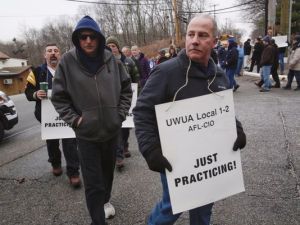Workers on strike continue to promote the mistaken belief that Indian Point provides 25% of the electricity used in the NYC/Westchester grid..In reality, the reactors are going out of business since they cannot compete with cheaper energy sources and we have a surplus of electricity. Since there is little profit to be made it is entirely possible that the company is, in fact, angling for a shut down as the head of the union suggests.
—
Contract negotiations pushed past a midnight strike deadline and are expected to continue Friday as Indian Point workers and owners try to avoid a lockout.
James T. Slevin, the president of the Utility Workers Union of America Local 1-2, said early Friday that Entergy, the Louisiana-based owner of the nuclear power plant, “called for a break in the marathon negotiations” so its representatives could rest.
“The union was ready to go but management needed some beauty sleep, while its appointed ‘negotiators’ and their overlords in Louisiana ignore the impact of their inaction on the fate of the working men and women who safely operate and maintain a nuclear power plant and on the communities they serve in New York state,” he said in a statement issued through the union.
Slevin said he expected talks to resume later Friday. The initial strike deadline had been set for midnight Wednesday before being bumped back to midnight Thursday.
On Thursday Slevin accused Indian Point’s owners of angling for a lockout, and said that if his members strike, Entergy will be to blame.
“Our livelihoods are at stake and Entergy…is looking to high tail it back to the Louisiana bayou,” Slevin said in a statement issued through the union Thursday morning.
Late Wednesday, both sides in the standoff agreed to extend until midnight Thursday the deadline for a collective bargaining agreement that would last through 2022, one year after Indian Point is slated to close.
The union’s 300 members, which include maintenance personnel, chemists and radiation protection specialists, voted to authorize a strike last Thursday.
“Already it has become apparent that Entergy will blame the workers if it forces a labor action,” Slevin said. “But make no mistake, if management tries to operate Indian Point in an unsafe manner with scab workers, it will be on them. For too long, corporations have gotten away with blaming the workers, while they sit on piles of cash and pay their shareholders, the public be damned.”
Entergy spokesman Jerry Nappi dismissed the union’s claims.
“Entergy is bargaining in good faith for a contract that continues to provide excellent benefits for the members of the union,” Nappi said.
In January 2017, Entergy announced it would shut down operations at the Buchanan plant by 2021, opening up a large hole in the energy supply for residents of Westchester County and New York City.
In the past, contract negotiations between the two sides have bumped up against midnight deadlines. This year was no different as talks extended deep into Wednesday night as both sides try to find common ground on a host of issues that have divided them over the past year.
The issue
Topping the list of worker concerns is whether they will have a role in the years-long dismantling process that will follow Indian Point’s shut down.
Workers who picketed outside the plant’s gates Tuesday said they’re reluctant to uproot their families for jobs at other Entergy plants. They fear Entergy will turn over the dismantling to a private company, a strategy it’s trying at its Vermont Yankee plant.
In November 2016, Entergy announced it would sell Vermont Yankee to NorthStar Group Services, a New York-based industrial demolition company. That sale is pending state and federal approvals.
Entergy has declined to comment on whether the workers will have jobs once the plant closes. The utility workers represent roughly one-third of Indian Point’s workforce of 1,000 and it’s likely other workers will try to secure jobs in the decommissioning.
If there is a strike, Entergy says its managers are trained to step in to fill the workers’ positions and safely operate the plant.
The Nuclear Regulatory Commission has been monitoring the talks and have put together a contingency plan if the two sides can’t come to an agreement.






